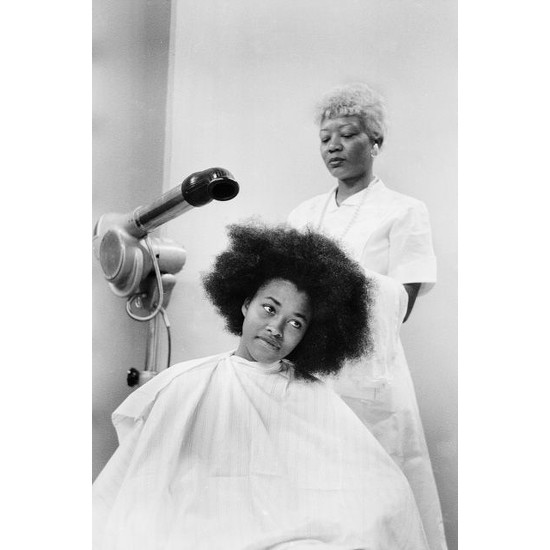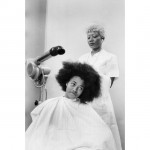
Leonard McCombe/Getty Images
The natural hair movement has opened up a series of conversations about black hair, ranging from the pressure to conform to Eurocentric beauty standards to the politics and economy of black hair. While sales of relaxers reportedly fell 26%, black women still spend 9 times more on haircare than women of other races.
The movement has also inspired a slew of media, from blogs, to podcasts, to web series, and documentaries, all seeking to inform and explore certain ideas about black hair. A scene from the 2009 Chris Rock-fronted documentary Good Hair also opened up a necessary discussion about the health-related repercussions of the long term use of products like relaxers, which often contain harsh chemicals. In the scene, Rock demonstrates how Sodium Hydroxide, an active ingredient in most relaxers, is strong enough to dissolve a metal can. In 2012, an alarming study that linked the use of relaxers to high instances of uterine fibroids in black women began circulating. The article spurred many African-American women to consider what chemicals that they might be exposing themselves to when processing their hair.
Despite the fact that more women are educating themselves, it seems that salon workers, who often face daily, regular exposure to harsh chemicals, have been left out of the conversation. Teni Adewumi, a graduate student and the environmental-justice program coordinator at the California nonprofit Black Women for Wellness, hopes to change this through her research and advocacy. When Adewumi surveyed a group of salon workers in Inglewood, California, she found that many of the women were experiencing similar symptoms and had similar concerns about their health. Sadly, many of them were unaware that the chemicals that they were interacting with might be causing their issues.
“When we held focus groups with salon workers, we found these stories of lack of education on chemical exposures and chemical-related health problems,” Adewumi says. “Even though they had all gone to beauty school, there was just really no training around what these products could do to your body and to your reproductive system.”
Adewumi hopes to see legislative changes at the national level that would enforce stricter regulations in salons across the country. In the meantime, she is working on a pilot program with the city of Inglewood that would further workplace education. She is also continuing to visit salons to talk to workers about their health.





[…] a graduate student and the environmental-justice program coordinator at Black Women for Wellness surveyed a group of salon workers in Inglewood, California and found that many of the individuals she spoke with had health concerns […]
[…] Women like Teni Adewumi, a graduate student and the environmental-justice program coordinator at the California nonprofit Black Women for Wellness, hope to educate and advocate both salon workers and beauty customers alike through outreach programs. […]